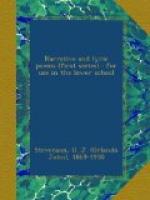And gave the leper to eat and drink;
’T was a mouldy crust of coarse brown bread,
’T was water out of a wooden bowl,—
Yet with fine wheaten bread was the leper fed, 300
And ’t was red wine he drank with his thirsty soul.
VII
As Sir Launfal mused with a downcast face,
A light shone round about the place;
The leper no longer crouched at his side,
But stood before him glorified,
305
Shining and tall and fair and straight
As the pillar that stood by the Beautiful
Gate,—[31]
Himself the Gate whereby men can
Enter the temple of God in Man.[32]
VIII
His words were shed softer than leaves
from the pine,
310
And they fell on Sir Launfal as snows
on the brine,
Which mingle their softness and quiet
in one
With the shaggy unrest they float down
upon;
And the voice that was calmer than silence
said,
“Lo, it is I, be not
afraid! 315
In many climes, without avail,
Thou has spent thy life for the Holy Grail;
Behold it is here,—this cup
which thou
Didst fill at the streamlet for me but
now;
This crust is my body broken for thee,
320
This water His blood that died on the
tree;[33]
The Holy Supper is kept, indeed,
In whatso we share with another’s
need,—
Not that which we give, but what we share,—
For the gift without the giver is bare;
325
Who bestows himself with his alms feeds
three,—
Himself, his hungering neighbor, and me.”
IX
Sir Launfal awoke, as from a swound;—
“The Grail in my castle here is
found!
Hang my idle armor up on the wall,
330
Let it be the spider’s banquet-hall;
He must be fenced with stronger mail
Who would seek and find the Holy Grail.”
X
The castle-gate stands open now,
And the wanderer is welcome to the hall
335
As the hangbird[34] is to the elm-tree
bough,
No longer scowl the turrets
tall,
The Summer’s long siege at last
is o’er;
When the first poor outcast went in at
the door,
She entered with him in disguise,
340
And mastered the fortress by surprise;
There is no spot she loves so well on
ground.
She lingers and smiles there the whole
year round;
The meanest serf on Sir Launfal’s
land
Has hall and bower at his command;
345
And there’s no poor man in the North
Countree
But is lord of the earldom as much as
he.
—Lowell.
[1] Just as the organist gets into the spirit of his theme by means of a dreamy prelude, so the poet by means of this introduction intends to suggest the spirit of the poem that follows.




